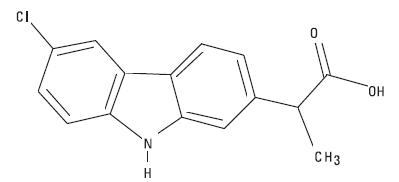Rimadyl Injection
Generic name: carprofen injection
Dosage form: FOR ANIMAL USE ONLY
On This Page
Non-steroidal anti-inflammatory drug
For subcutaneous use in dogs only
CAUTION
Federal law restricts this drug to use by or on the order of a licensed veterinarian.
Rimadyl Injection Description
Rimadyl Injectable is a sterile solution containing carprofen, a non-steroidal anti-inflammatory drug (NSAID) of the propionic acid class that includes ibuprofen, naproxen, and ketoprofen. Carprofen is the non-proprietary designation for a substituted carbazole, 6-chloro-α-methyl-9H-carbazole-2-acetic acid. The empirical formula is C15H12CINO2 and molecular weight 273.72. The chemical structure of carprofen is:

Each mL of Rimadyl Injectable contains 50.0 mg carprofen, 30.0 mg arginine, 88.5 mg glycocholic acid, 169.0 mg lecithin, 10.0 mg benzyl alcohol, 6.17 mg sodium hydroxide, with additional sodium hydroxide and hydrochloric acid as needed to adjust pH, and water for injection.
Rimadyl Injection - Clinical Pharmacology
Carprofen is a non-narcotic, nonsteroidal anti-inflammatory agent with characteristic analgesic and antipyretic activity approximately equipotent to indomethacin in animal models.1
The mechanism of action of carprofen, like that of other NSAIDs, is believed to be associated with the inhibition of cyclooxygenase activity. Two unique cyclooxygenases have been described in mammals.2 The constitutive cyclooxygenase, COX-1, synthesizes prostaglandins necessary for normal gastrointestinal and renal function. The inducible cyclooxygenase, COX-2, generates prostaglandins involved in inflammation. Inhibition of COX-1 is thought to be associated with gastrointestinal and renal toxicity while inhibition of COX-2 provides anti-inflammatory activity. The specificity of a particular NSAID for COX-2 versus COX-1 may vary from species to species.3 In an in vitro study using canine cell cultures, carprofen demonstrated selective inhibition of COX-2 versus COX-1.4 Clinical relevance of these data has not been shown. Carprofen has also been shown to inhibit the release of several prostaglandins in two inflammatory cell systems: rat polymorphonuclear leukocytes (PMN) and human rheumatoid synovial cells, indicating inhibition of acute (PMN system) and chronic (synovial cell system) inflammatory reactions.1...



